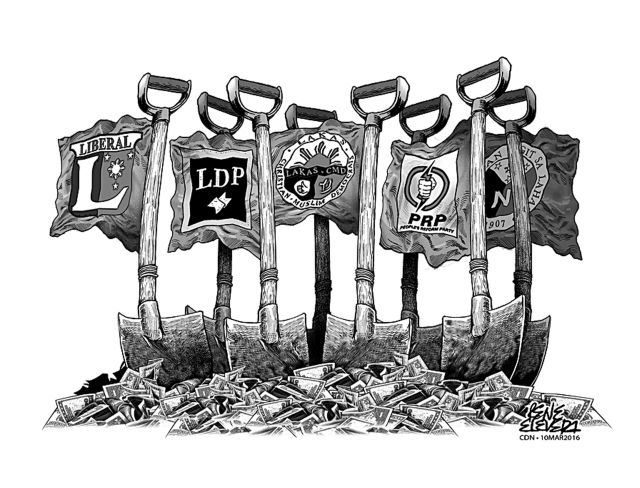The recent snub of the Liberal Party (LP) leadership of erstwhile local LP loyalists like Talisay City Mayor Johnny V. Delos Reyes illustrates the significant differences between this country’s multi-party system and the more uniform, dual or even triple party systems of other progressive and politically mature countries like the US and those in Europe.
The reemergence of the multi-party system—the late strongman Ferdinand Marcos created his own the Kilusang Bagong Lipunan (KBL) after leaving the Nacionalista Party—came when then defense secretary Fidel Ramos refused to accept the LDP nomination of his then rival, the late House Speaker Ramon Mitra as the party’s standard bearer.
Like their US counterparts, the Republican and Democratic parties, the ruling LP and Nacionalista parties have developed their own political networks which they mobilize to support their chosen standard bearers and slate of candidates for both national and local candidates.
The similarities end there however. In the US, both the Republican and Democratic parties have a diverse network of sub parties and groups that not only wield influence on the policy stands of both parties but also funnel funds to support the candidacies of those aspiring to run under either of these parties.
Thus the Republicans are supported by and are usually identified with Big Business while the Democrats are supported by labor unions, workers and left wing groups—there are communist groups within their fold—and as such are either moderate or left of center.
Unlike Filipino candidates, American candidates undergo rigorous campaigning and screening to gain support from either the Republican or Democratic Party, thus the caucuses, the primaries and the debates. In contrast the local parties like the Alayon rely almost exclusively on the Manila-based parties for their funding.
The American political party system is not above receiving donations from powerful lobbyists like the National Rifle Association (NRA) but the diversity and sustainability of their core network of support groups have helped balance out or even caused these parties to thumb down these influence peddlers. These support groups also have sizable sectors that expect and demand accountability from their leaders.
Such is not the case here in the Philippines where the ruling parties and their machinery are propped up by taxpayers money than their own resources.
And local ruling parties like the Alayon, which advertises itself as having influence over Cebu’s 1st district, are expected to have the ears of the ruling parties rather than party loyalists like JVR, who must now court the support of other national parties to fund their own campaigns.
All these debates are more for show and sadly we’re not going to expect any changes to the current setup anytime soon.
Disclaimer: The comments uploaded on this site do not necessarily represent or reflect the views of management and owner of Cebudailynews. We reserve the right to exclude comments that we deem to be inconsistent with our editorial standards.

